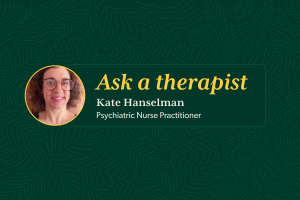It’s important to spread awareness about the prevalence of mental health issues and the negative effects of stigma surrounding them. This is why events like PTSD Awareness Month exist—to promote learning, growth, acceptance, and change within our cultures and society. Post-traumatic stress disorder (PTSD) is a mental health condition caused…
Mental Health Topics
We often use “stress” and “anxiety” interchangeably, to describe intense worry or emotional distress. But in reality, there are distinct differences between the two—for example, one is considered a healthy emotion that can be beneficial, while the other is considered an unhealthy emotion that is all-around harmful. Let’s explore these…
When you seek out mental health services, inevitably the question of cost becomes a factor. How much will you end up paying? Will your insurance cover your visits? And if you don’t have insurance, you may wonder, “How much does a psychiatrist cost without insurance?” While getting an exact cost…
Want to talk to a psychiatric nurse practitioner?
Start working with one of our top-rated providers. We have availability now and accept most major insurances.
According to the Centers for Disease Control and Prevention (CDC), it’s estimated that approximately 1 in 36 children will be born with autism spectrum disorder (ASD). ASD is one of the more common neurodevelopmental disorders—and you might be wondering, especially if you or another family member has ASD, if autism…
Everyone faces some amount of stress in their daily lives. Stress is an important part of functioning—it alerts our body to pressure, marking certain situations as important or even dangerous. However, our bodies are not meant to feel constant, long-term stress, as it is still a state of physical, mental,…
Everyone can have intrusive thoughts from time to time, but when you have obsessive-compulsive disorder, intrusive thoughts can go from being a nuisance to something anxiety-ridden, single-minded, and uncontrollable. OCD can be extremely difficult to control, affecting how one lives and has to move throughout the world. However, with proper…
Want to talk to a therapist?
Start working with one of our top-rated providers. We have availability now and accept most major insurances.
“I hate my life” has become a popular sentiment over the years. People say it for all sorts of reasons: stressful work environment, turbulent love life, lack of friends, concern for the world at large. The real problem occurs when people start to say it and mean it. As much…
For people who are curious about antidepressant medications, particularly selective serotonin reuptake inhibitors (SSRIs), the possibility of weight gain is sometimes a concern. Celexa, the brand name of the generic drug Citalopram, is a common type of SSRI that may be associated with a small gain in weight. If you’ve…
Though therapy is often seen at the forefront of mental health care, medication is another important part of treatment for many mental health conditions. From ADHD to depression, medication can help make symptoms manageable in day-to-day life, allow people with mental health conditions some relief, and support coping and problem-solving…
Borderline personality disorder (BPD) is a mental health condition that causes difficulty with emotional regulation, behavioral issues, and self-image struggles, which can result in mood swings, unstable relationships, and self-destructive and impulsive behavior. BPD is one of many personality disorders, which are a consistent pattern of experiences of oneself and…
Therapy is an important resource that helps people from all walks of life. With all of the terms and types of therapy out there, it can be hard to discern which one might be best for you. Luckily, we’re here to help take some of the mystery out of things…
Death and loss are experiences no one wants, and it’s never easy. It often leaves one different than they were before. Unfortunately, they are also universal experiences—everyone will live through some kind of loss during their life, whether that be due to death, job loss, divorce, or another source. The…

Trending Categories
- Relationships
- Self-Improvement
- Feelings & Emotions
- Research
- Beginning Therapy
- Disorders
- Anxiety
- Media Use
- Mental Health Awareness
- Children, Teens, & Adolescents
- Parenting
- Depression
- Work & Careers
- Psychology
- Stress
- Communication
- Self-Care
- Coping Skills
- COVID-19
- Family
- Grief & Loss
- Health & Exercise
- Personality
- Sleep
- Alcohol & Drugs
- Medication
- Addiction
- Trauma
- Ask a Therapist
- Loneliness
- Psychiatry
- ADHD
- Power & Control
Mental Health Disorders (DSM-5)
- Adult Antisocial Behavior
- Acute Stress Disorder
- Adjustment Disorder
- Agoraphobia
- Alcohol Use Disorder
- Anorexia Nervosa
- Antidepressant Discontinuation
- Antisocial Personality Disorder
- ADHD
- Autism Spectrum Disorder
- Avoidant Personality Disorder
- Avoidant Restrictive Food Intake Disorder
- Binge Eating Disorder
- Bipolar 2 Disorder
- Body Dysmorphic Disorder
- Caffeine Withdrawal
- Cannabis Use Disorder
- Cocaine Use Disorder
- Conduct Disorder
- Cyclothymic Disorder
- Delusional Disorder
- Dependent Personality Disorder
- Excoriation Skin Picking Disorder
- Exhibitionistic Disorder
- Fetishistic Disorder
- Gambling Disorder
- Gender Dysphoria
- Generalized Anxiety Disorder
- Genito-Pelvic Pain Penetration Disorder
- Histrionic Personality Disorder
- Hoarding Disorder
- Illness Anxiety Disorder
- Inhalant Use Disorder
- Insomnia
- Kleptomania
- Language Disorder
- Major Depressive Disorder
- Male Hypoactive Sexual Desire Disorder
- Narcissism
- Nightmare Disorder
- Obsessive Compulsive Disorder
- Obsessive-compulsive Personality Disorder
- Panic Disorder
- Paranoid Personality Disorder
- Pedophilic Disorder
- Posttraumatic Stress Disorder
- Pyromania
- Rumination Disorder
- Schizoid Personality Disorder
- Schizophrenia
- Schizophreniform Disorder
- Selective Mutism
- Separation Anxiety Disorder
- Sexual Sadism Disorder
- Social Anxiety Disorder
- Tobacco Use Disorder
- Tourettes Disorder
- Trichotillomania Hair Pulling Disorder
- Uncomplicated Bereavement
- Unspecified Personality Disorder
- Unspecified Sexual Dysfunction












